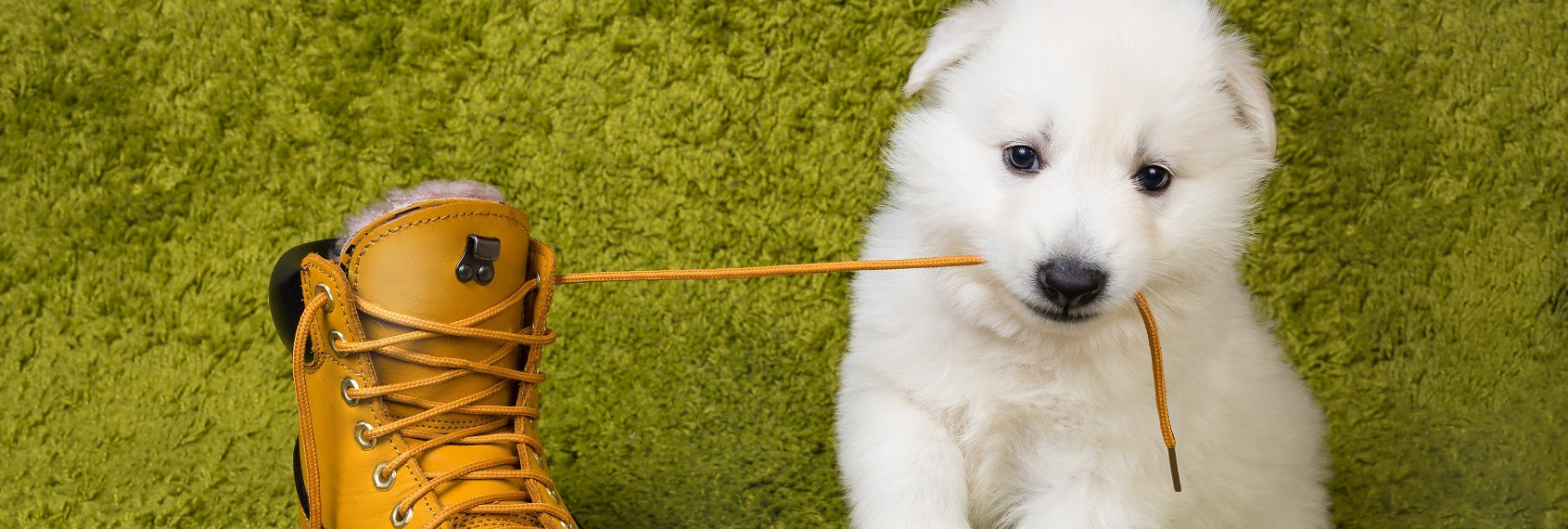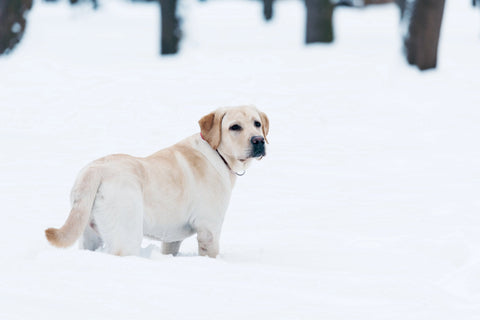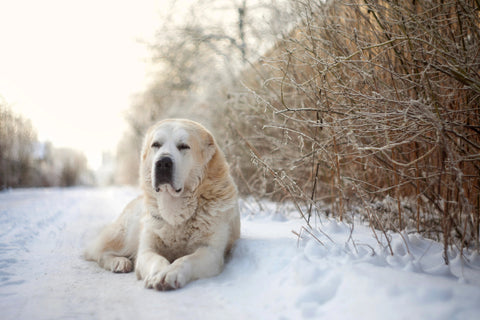Just like with human babies, dog teething can be a major challenge for your puppy, too. As dogs are born without teeth, sharp puppy teeth erupting from the gums can be very painful. You can expect dog teething to happen in a predictable timeline.
As stated by VCA Hospitals, your puppy is teething the same way that human babies and children grow new teeth during their development. There are several puppy teeth stages that your dog will go through. Do dogs lose baby teeth? Like a human baby, your furbaby first grows a set of baby teeth (also called primary or deciduous, meaning they fall out). These teeth are pointed and sharp, which is why they are sometimes referred to as needle teeth.
"Puppies are born without teeth, and when puppy teeth erupt from the gums it can be very painful."
Here, we have come up with a timeline on what to expect at certain stages of your dog's teething. You’ll learn ways you can manage the stages of puppy teething to help relieve teething discomfort and prevent inappropriate chewing.

Stages of Dog Teething
When do dogs start teething? When do dogs lose their baby teeth? How long does puppy teething last? When do dogs get their permanent teeth? Dog teething and behavior will depend on the different stages of puppy teething and when your puppy is experiencing their new teeth coming in. Keep in mind a basic puppy teething schedule so that you are prepared for the stages of puppy teeth and chewing.
Here are the stages of puppy teething and dog teething stages:
From birth to the second week. Are puppies born with teeth? No. Your puppy is born without teeth. In their first week of life, they will be opening their eyes and they will be nursing from their mother together with their littermates.
From the second week to the fourth. During these weeks, your dog's incisors, the narrow-edged teeth, will begin to surface. Your pup will have incisors on both the top and bottom jaw. You may hear these baby teeth referred to as “milk teeth”, because your pup will still be nursing when these teeth show up.
From week five to eight. By this time in the dog teething stage, your pup's last molars will emerge. At about 8 weeks of age, your pup will start to lose their deciduous teeth. The roots will resorb and the new set of adult teeth will make their way out through the gums.
From week twelve to sixth months. When do dogs get permanent teeth? In this stage of dog teething, from approximately twelve weeks to six months, the baby teeth of your pup will begin to fall out and the permanent ones will begin to appear. This is the stage where it'll be most painful for your dog. They will begin chewing on all things they can get their teeth on. This can be the stage where you gently introduce brushing your dog’s teeth.
Six month and up. At this period of your dog's teething, all baby teeth should be replaced with permanent ones . Any baby teeth left after the 6-month mark can pose dental issues and must be removed by your vet as soon as possible.
Signs to look for if you are considering taking your pup to the vet:
- Presence of blood in your pup's chews and toys
- Bleeding and inflamed gums
- Cracked or broken teeth
- Oblique teeth or a misalignment of the upper and lower jaw
- One tooth overlapping another
- Loose permanent teeth
Managing Puppy Teething and Dog Teething
Now that you know the dog teething stages, let's look at how to manage them. Here are some ways how to help a teething puppy get through the puppy teething stages:
Give cold fruits for sore gums. hewing is a natural instinct for dogs, but for teething puppies, it can turn impulse into overdrive. This is because chewing is a self-soothing activity for teething puppies and they are experiencing discomfort in their mouths during teething.
Providing your pup with frozen fruits like blueberries, bananas, and strawberries they can chew on is a great way to temporarily numb their gums and help manage the sore. It can get a bit messy but these are loaded with vitamins and minerals and the cold will feel nice on their sore gums and teeth.
Do not give ice cubes. Can puppies have ice cubes for teething? Ice cubes for teething puppies are not a good idea because they are extremely hard for a puppy's fragile baby teeth. Allowing them to chew on ice cubes might increase their chances of having a broken tooth, which is the last thing you want in the middle of puppy teething. Stick to frozen fruits instead for the similar benefits and much less risk.
No punishments. Teething is normal, although it can be frustrating for both the pet parent and puppy. However, punishing your pup for chewing things will only do more harm than good. Keep in mind that your puppy is trying to find an outlet for their discomfort from teething. If you see them gnawing on something inappropriate, get their attention, and redirect them to something else. If they do a good job of not chewing inappropriate items, reward them! Positive reinforcement is always best.
Do not self-medicate a teething puppy. Giving your pup over-the-counter pain medications without the prescription of your veterinarian can have negative effects on your dog. Be sure to check with your vet before giving any medication or ask for a prescription from them.
Introduce appropriate chews. Provide your pup with chews that are high-quality and full of nutrients. Do not just give him any chews as this can lead to choking hazards, broken teeth, and even gastrointestinal upset.
According to Vet Street, “always make sure whatever you give them does not resemble anything of yours that you don’t want them to chew — this means no old shoes! Don't give them anything that resembles something they can find around the house, either: no socks and no stuffed animals (if you have children who collect them). What your puppy learns to chew on at an early age will tend to be what they look to chew on for the rest of their life.”
How Can Pet Parents® Help Your Teething Dog?
Your pup, however, may never outgrow their urge to chew. As a pet parent, we highly encourage you to provide high-quality chews to act as dog teething toys for your furbaby. This will help you be able to handle your dog's gnawing as they age.
And it happens that one of the safest and most reliable chews in the market available today is that from Pet Parents® - Gnawtlers®.
After those 6 months, your pup has their permanent teeth. We recommend our split elk, the softest of our antlers with exposed bone marrow to keep your pup intrigued. Being the softest of the premium Gnawtlers®, these will make great dog teething toys as your puppy learns how to use their new set of adult teeth. Since their gums and teeth may still be sensitive from all the movement and changes in their mouth, these dog teething toys will provide a safe outlet for them, while also giving a better alternative to chewing your rug or furniture.
Gnawtlers® are premium antler chews from deer and elk that are carefully selected according to their color, weight, size, density, and quality. These antler chews are all-natural and do not contain any artificial flavoring, fragrance, and dyes to make it more appealing to your furbaby. This means you can feel good about giving your dog our split elk antler chews during the stages of puppy teething because they are safe, delicious, and nutritious.
Pet Parents® Gnawtlers® have different options that will definitely fit your fur-baby's gnawing needs. There are whole antler chews for adult dogs and there are also split antler chews for senior dogs and puppies. These chews also help keep your fur-baby's teeth clean as it is important in so many ways. You can learn more about how chews can aid in dog teeth here.
The stages of dog teething can be tricky but there are no problems love, care, and patience can't solve. Puppy teething stages can be tough to deal with but remember that it won’t last forever. Generally, dog teething ages are between twelve and sixteen weeks and they will gain their permanent teeth during that stage. Helping your dog through these few weeks will set them on the right path for their journey towards a permanent set of good, healthy teeth.









